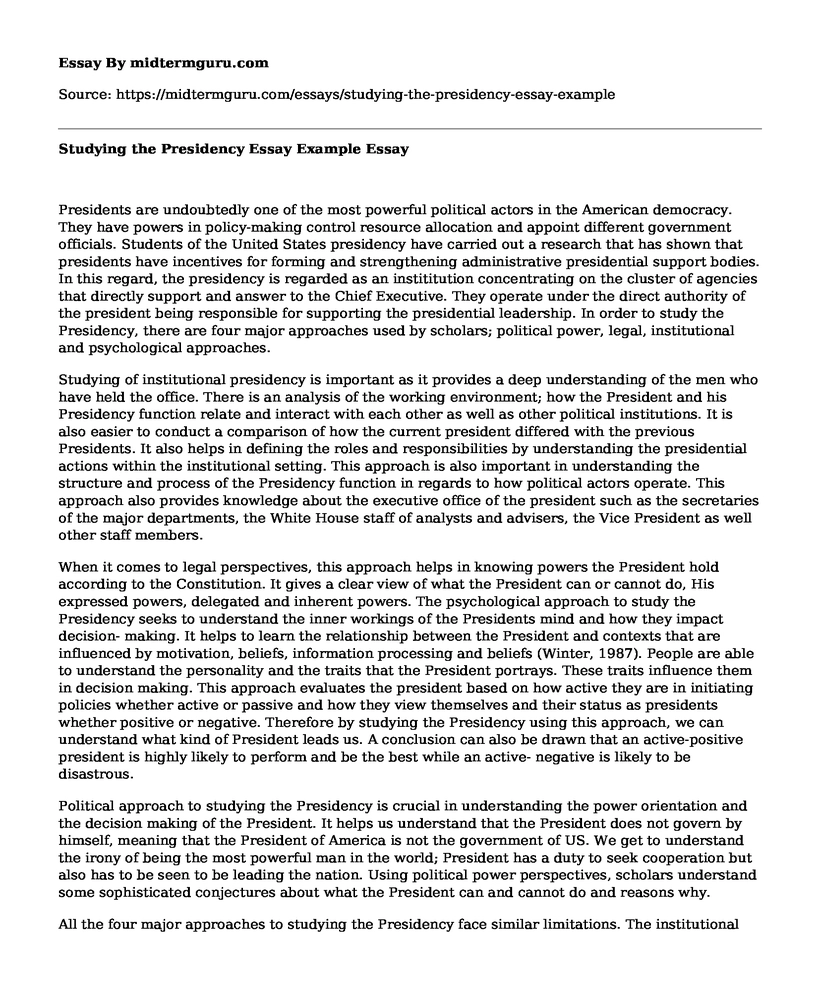Presidents are undoubtedly one of the most powerful political actors in the American democracy. They have powers in policy-making control resource allocation and appoint different government officials. Students of the United States presidency have carried out a research that has shown that presidents have incentives for forming and strengthening administrative presidential support bodies. In this regard, the presidency is regarded as an instititution concentrating on the cluster of agencies that directly support and answer to the Chief Executive. They operate under the direct authority of the president being responsible for supporting the presidential leadership. In order to study the Presidency, there are four major approaches used by scholars; political power, legal, institutional and psychological approaches.
Studying of institutional presidency is important as it provides a deep understanding of the men who have held the office. There is an analysis of the working environment; how the President and his Presidency function relate and interact with each other as well as other political institutions. It is also easier to conduct a comparison of how the current president differed with the previous Presidents. It also helps in defining the roles and responsibilities by understanding the presidential actions within the institutional setting. This approach is also important in understanding the structure and process of the Presidency function in regards to how political actors operate. This approach also provides knowledge about the executive office of the president such as the secretaries of the major departments, the White House staff of analysts and advisers, the Vice President as well other staff members.
When it comes to legal perspectives, this approach helps in knowing powers the President hold according to the Constitution. It gives a clear view of what the President can or cannot do, His expressed powers, delegated and inherent powers. The psychological approach to study the Presidency seeks to understand the inner workings of the Presidents mind and how they impact decision- making. It helps to learn the relationship between the President and contexts that are influenced by motivation, beliefs, information processing and beliefs (Winter, 1987). People are able to understand the personality and the traits that the President portrays. These traits influence them in decision making. This approach evaluates the president based on how active they are in initiating policies whether active or passive and how they view themselves and their status as presidents whether positive or negative. Therefore by studying the Presidency using this approach, we can understand what kind of President leads us. A conclusion can also be drawn that an active-positive president is highly likely to perform and be the best while an active- negative is likely to be disastrous.
Political approach to studying the Presidency is crucial in understanding the power orientation and the decision making of the President. It helps us understand that the President does not govern by himself, meaning that the President of America is not the government of US. We get to understand the irony of being the most powerful man in the world; President has a duty to seek cooperation but also has to be seen to be leading the nation. Using political power perspectives, scholars understand some sophisticated conjectures about what the President can and cannot do and reasons why.
All the four major approaches to studying the Presidency face similar limitations. The institutional and operational aspects of the Presidency are highly secretive meaning that the presidential documents can remain closed for decades. Therefore there is no primary source of material available. The President is a very senior person in any country; therefore he is heavily guarded all the time. In an attempt to get in-depth understanding of him as a personal, researchers may choose to do a one on one interview with him. Getting that chance to interview him is very difficult due to his schedules. If one is lucky to get an interview, the information to be disclosed is very minimal. Also, interviews with administration officials can be incomplete and biased. Compared to scholars, high-profile journalists are more likely to gain access to information. Therefore the researcher will not get the real and true facts about the President.
References
Nelson, M. (2010). The presidency and the political system. Washington, DC: CQ Press
Winter, D. G. (1987). Leader appeal, leader performance, and the motive profiles of leaders and followers: A study of American presidents and elections. Journal of personality and social psychology, 52(1), 196.
Cite this page
Studying the Presidency Essay Example. (2021, May 24). Retrieved from https://midtermguru.com/essays/studying-the-presidency-essay-example
If you are the original author of this essay and no longer wish to have it published on the midtermguru.com website, please click below to request its removal:
- NATO and Libya: A Defensible Intervention in a Sovereign State - Paper Example
- Essay on Identification and Description of Niccolo Machiavelli
- Essay Sample on Strategies Employed by White Settlers to Legitimately Occupy Indian Land
- Pre-Fabricated Housing Policy - Essay Sample
- A Look at Types of Democracy: Direct & Representative - Essay Sample
- American Dream: Achieving Your Goals and Creating Your Own Reality - Essay Sample
- Trump's Immigration Policy: Impact on US Employment - Essay Sample







